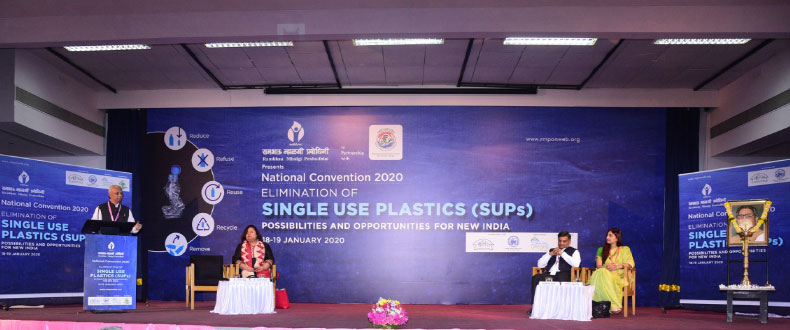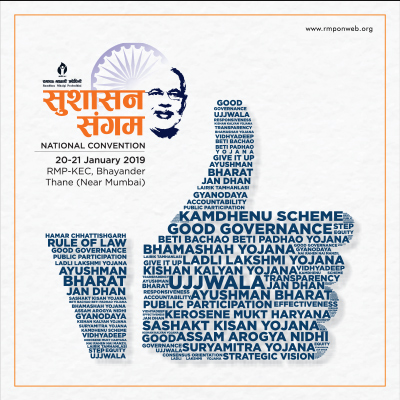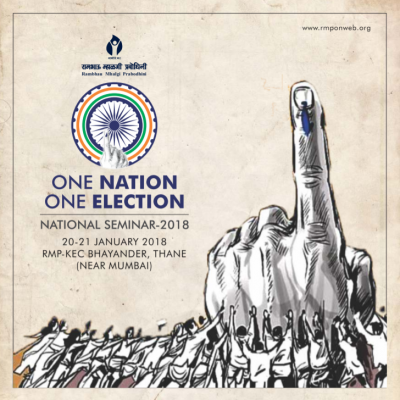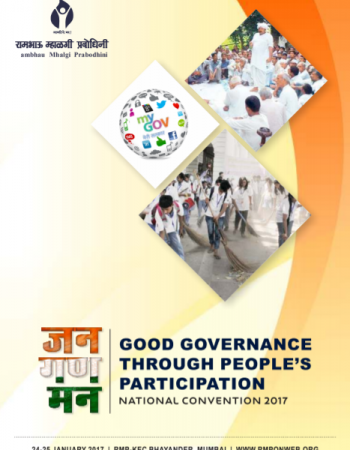Rambhau Mhalgi Prabodhini (RMP) has been organizing the National Convention on various social issues since 2010 where academicians, researchers, industry leads, social entrepreneurs, policymakers, and other stakeholders are invited to send in abstracts for research papers, successful case studies, innovations, anecdotes and posters for a cohesive policy dialogue to be conducted at the National Convention. The conventions is an opportunity to bring together voices, ideas and innovations in strategies and policies to have a cohesive impact-oriented dialogue.
About National Convention

National Convention 2020
In continuation with the mandate of ‘Swachh Bharat Abhiyaan’, Hon’ble Prime Minister of India, Shri Narendra Modi has committed to phase out single use plastics (SUPs) by 2022. Ever since plastic was invented by John W Hyatt in 1869, it has been an integral part of our modern lives. The flexibility, lightness and durability of plastics have added to the convenience of mankind and therefore have entered into various spaces of our lives. From using a plastic toothbrush, drinking water from a plastic bottle to using a plastic bag for multiple purposes, the use of plastic has become ubiquitous. At the same time, the pervasive use of plastics has resulted in one of the greatest environmental, health, social and economic challenges worldwide.
SUPs refer to plastics which are used just once, as in disposable packaging such as bottles, grocery bags, plates, cutlery, and straws. According to the United Nations, any plastic made out from polymers of High Density Polyethylene (HDPE), Low Density Polyethylene (LDPE), Polyethylene Terephthalate (PET), Polystyrene (PS), Polycarbonate, Polypropylene (PP), and Expanded polystyrene (EPS) is SUPs.The elimination of SUPs has become a worldwide campaign as its large and growing volume adds enormously to the total plastic waste. Governments around the world are increasingly working to scale up efforts to address plastic pollution. According to a report by the United Nations Environment Programme (UNEP) more than 60 countries have introduced bans and levies to curb single-use plastic waste. It also estimated that one to 5 trillion plastic bags are consumed worldwide each year. Five trillion is almost 10 million plastic bags per minute.
India produces about 15,000 tonnes of plastic waste daily. Out of this about 9,000 tonnes is recycled. The remaining plastic is either burnt leading to air pollution or ends up in landfills or clogs drains, resulting in social concerns for the municipal administration and citizens in different parts of the country. A FICCI study estimates that 43 per cent of India’s plastic is used in packaging and much of it is SUPs. Taking environmental impacts into consideration, imposing a ban on SUPs, combined with the adoption of better waste management models like the segregation of wastes or proper division of wastes, can go a long way in achieving the targeted goals in different parts of the country.
To address the growing concerns, there are certain initiatives, offering pragmatic solutions, which have been undertaken by the government. For instance, taking cognizance of the available technology, the government has started using plastic to build roads which will not only withstand future monsoon damage but also solve the problem of disposing of non-recyclable plastic. According to the World Economic Forum (WEF) such roads are durable against extreme weather conditions, cost effective and pothole resistant. With one tonne of plastic, one kilometer of road can be made. More than one lakh kilometers of roads have already been constructed in India using plastic waste in at least 11 states, including Tamil Nadu, Maharashtra and Madhya Pradesh among others.
Besides, a growing number of governments at the state and local levels are also taking actions to address the challenge of SUPs through imposition of bans. In this direction, several states such as Himachal Pradesh, Karnataka, Punjab, Haryana, Kerala, Maharashtra, Sikkim, Delhi and West Bengal among others have introduced bans on the manufacturing, production, distribution, use and storage of plastic carrier bags and other plastic materials.
Many success stories can be drawn from these different states of India that can provide meaningful lessons for addressing the challenge in an effective manner. Learning from the experience of different states across India as well as countries across the globe that have introduced bans and regulations on SUPs can help formulate deliverable action-plans and drive innovation. Addressing the irreparable environmental impact of SUPs as well as effective delivery of the Indian government’s initiative to phase out SUPs would require governments at both national and state level to regulate the use of SUPs, businesses to innovate and individuals to act.
SUPs have become a national challenge, a matter of academic discourse and policy deliberation. Rambhau Mhalgi Prabodhini (RMP) has set a tradition to address contemporary societal, policy, political and governance challenges through research, dissemination and awareness by organizing various workshops and seminars on such pertinent issues. In continuation with earlier National Conventions, this year RMP’s National Convention would be themed around “Elimination of Single Use Plastics (SUPs): Possibilities and Opportunities for New India”.
The main aim of the National Convention is to deliberate on some pertinent questions: What are the initiatives at national and state levels to eliminate the use of SUPs? What have the governments (central & state), businesses and individuals achieved at national and state levels to curb the consumption of SUPs? What are the lessons that these practices offer for policymakers who are considering regulating the production and use of SUPs? What are the measures that the government needs to undertake to improve waste management practices? What are the nature of financial incentives that the government needs to introduce to change the habits of consumers, retailers and manufacturers? What is the extent of finance that the government would require to invest in research and development of alternative materials, raise awareness among people and fund innovation? What impact will the preferred course of action have on different sectors and industries?
Themes discussed at the Convention:
- The Plastic Problem: Effects on Environment, Health and Civic Management
- Achieving Plastics (SUPs) Free India through alternatives to Plastic
- The other side of the Plastic Story: Effect on Industry and Jobs
- Successful Case studies from Public, Private, Industrial, Civil Society Sector
- Roadmap to SUP Free India: Role of Society, Government, Industry
National Convention 2019
Indian democracy has evolved over centuries. Globally, India has earned the recognition of being a cradle of spiritual democracy. Good Governance is a necessary requirement for a sustainable democracy to deliver development and welfare to its citizens.
Good Governance is generally defined in the form of ways and mechanisms by which different stakeholders of a democracy namely, legislature, judiciary, executive, private sector, civil society and citizens work to secure justice, empowerment, employment and efficient delivery of services in the country.
International developmental organizations like UN, World Bank, Asian Development Bank etc. have defined Good Governance in different ways but they all broadly agree on the following eight points being the key components of good governance: –
Accountability both political and bureaucratic, Participation of various stakeholders in the decision-making process, Rule of law, Transparency and freedom of information, Responsiveness, Equitable and inclusiveness, Effective and efficient administration and Robust grievance redressal mechanisms. In this backdrop of increased national consciousness about Good Governance and its rewards, Rambhau Mhalgi Prabodhini has decided to hold its annual National Convention on the topic of Sushasan Sangam. This 2-day convention is being held at RMPs Knowledge Excellence Centre in Bhayander, Thane (Near Mumbai) on 20-21 January 2019.
Objectives
- To provide a platform to the practitioners – government officials, NGOs, civil society organizations and individuals to present their experiences, best practices and successful good governance projects.
- To develop a repository of knowledge pool of case studies, policy initiatives, success stories, in order to establish a network for mutual learning.
- To understand and share the theoretical framework and parameters developed in the field of Good Governance and its various dimensions.
Sub Themes
What governments ought to do while they progress on the path of delivering Good Governance, is beautifully captured by authors Osborne and Gaebler in their book Reinventing Government. Based on their work, RMP has decided to keep following as also the Convention sub-themes :-
- Steering rather than rowing, Catalytic Government
- Empowering rather than serving, Community owned government
- Injecting competition into service delivery, Competitive Government
- Funding the outcomes not inputs, Result Orientated Government
- Meeting the needs of the customer and not bureaucracy, Customer driven government
- Prevention better than cure, Anticipatory Government
- From hierarchy to participation and team work, Decentralized government
- Leveraging the change through Market, Market oriented government
National Convention 2018
Decades together, India has been rightly taking pride in its functional democracy. Aspects like smooth conduct of elections as per the schedule, seamless transfers of power when there is a change in the mandate and diminishing role of violence over the years, have made election management system in India earn admiration from all over the world. While such aspects certainly merit recognition and praise, it doesn’t mean that no reforms are needed in the way we in India conduct elections. For several years, many important reforms suggested by the election commission of India as well as individuals and organisations are waiting for decisions at various levels. While these reforms are mainly about campaign finance, preventing inducement to voters on the eve of elections, curbing unreasonable controls that are imposed immediately after imposition of model code of conduct and the much talked about paper proof of votes caste through EVMs; the wider subject of multiplicity of elections and its menacing impact on governance is often neglected,considering that multiplicity of elections is unavoidable.
ONE NATION ONE ELECTION
Multiplicity of elections makes the entire nation in a permanent election mode. In India, in a span of five years apart from Lok Sabha Elections, the nation witnesses at least eight rounds of assembly elections in some years even two rounds and innumerable rounds of local elections including municipalities and gram panchayats.
Nation has been paying a heavy price for this seemingly inevitable Multiplicity of Elections. It starts with a long, arduous Code of Conduct, which is ethically correct but practically problematic. In the name of Election Code, the entire Government machinery almost gets an official license to stop working or at least stop completing the undergoing work. Election Code has become more of a stumbling block than a true code of administrative impartiality ending every kind of favoritism. Secondly, the idea of Good Governance habitually takes a beating every time elections are round the corner. Governance involves larger Good of the People and not just earning popularity. But when elections are around, rulers are scared to take even simple regulatory mechanism related decisions as the lurking fear of people going against them tops their thought process. As a consequence, postponing unpopular decisions has set in as a practice and we all eventually have to pay its price. Thirdly, when elections are near, populist demands are pushed by various groups as they know that at least for now, the Government may not dare to say no. All this has promoted both, competitive populism and a tendency to indulge in competitive compromises with Good Governance. Fourthly, the financial cost of conducting elections independently is also so huge that a nation like India doesn’t afford the same in any way. The fifth point is about multiplicity of electoral mechanisms as well. From electoral rolls to distribution of booths and polling stations, either there is needless differentiation or duplication and that causes both, needless expenditure and wanton creation of confusion. One Nation- One Election has the potential of taking care of many such issues, undoubtedly!
Multiplicity of elections also impacts upon the quality of mandate. Public memory is always short, but repeated elections being a contest between almost the same competitors is also likely to lure them to switch their preferences within a relatively shorter span of time. This amounts to creating an atmosphere of uncertainty and political instability as well.
The idea is widely being discussed today in various academic circles and expert groups after Prime Minister Narendra Modi informally floated this in year 2016 in an all-party meeting held prior to the Budget Session. Mr Modi who himself is a strong votary of the concept has thereafter raised it again for wider debates and discussions at various forums. Pitching in the case for simultaneous elections he had said that ‘Elections are held all the time and continuous polls lead to a lot of expenditure. Huge number of government employees including a large number of teachers are involved in electoral process causing maximum harm to the education sector. Security forces too have to be diverted for the electoral work leaving the borders precarious’.
The Standing Committee on Personnel, Public Grievances, Law and Justice under Chairperson Dr. E.M. Sudarsana Natchiappan in its report submitted on December 17, 2015 on the “Feasibility of Holding Simultaneous Elections to House of People (Lok Sabha) and State Legislative Assemblies‟ too favoured the One Nation One Election idea. Citing the reasons for its recommendation, the report had mentioned that ONOE would reduce: (i) the massive expenditure that is currently incurred for the conduct of separate elections; (ii) the policy paralysis that results from the imposition of the Model Code of Conduct during election time; and (iii) impact on delivery of essential services and (iv) burden on crucial manpower that is deployed during election time.
The idea further got reassertion from Former President Shri Pranab Mukherjee during his Republic Day speech when he mentioned that “The time is also ripe for a constructive debate on electoral reforms and a return to the practice of the early decades after Independence when elections to the Lok Sabha and state assemblies were held simultaneously. It is for the Election Commission to take this exercise forward in consultation with political parties”.
WAY AHEAD
Exploring the possibility of conducting simultaneous elections remains a difficult yet probable solution to all the problematic issues which are the direct outcome of multiplicity of elections. Prime Minister Narendra Modi, among others is a strong votary of One Nation, One Election.
He has appealed political scientists and researchers, politicians and election administrators as well as people at large to discuss the idea of simultaneous elections and deliberate on various issues concerning its practicality and implementation mechanism. Rambhau Mhalgi Prabodhini is organising this National Seminar on ONOP on this setting. We have invited political scientists, researchers, students, persons who are associated with election management and political party representatives as well as citizens to contribute in this churning of ideas.
National Convention 2017
Democracy in India has evolved over centuries. India has earned universal recognition as the cradle of Spiritual Democracy. Political Democracy with the idea of autonomous society has remained inherent to the concept of democracy in India. In the recent past, from the ‘Dark days of emergency’ to ‘Citizen’s rating government’s performance’, India has come a long way as a democratic nation state.
Good governance is a necessary condition for a stable and prosperous democracy which is not possible without public participation. The concept of peoples’ participation has been defined and implemented differently by different users of the term across the globe. However, the parameters of participation have been debated along with various criteria such as: involvement of the local community in decision making, implementation strategies, sharing of direct and indirect benefits and monitoring and evaluation of the projects.
Public information education, Consultation and Citizen Engagement are widely considered as the tools of People’s Participation. Experiences in most of the government sponsored projects have shown that the involvement of the community, in general, is sub-optimal. While this being so, the involvement of NGOs as intermediary agencies is expected to accelerate the pace of project implementation and ensure quality and sustainability. The process of people’s participation, therefore, requires a triangular partnership among the local community, NGOs and Government Agencies.
About Jan-Gan-Man
In this backdrop, Rambhau Mhalgi Prabodhini (RMP) is organizing a 2-day conference as part of its National Convention on the theme – “Jan Gan Man: Good Governance through People’s Participation” on 24-25 January, 2017 at RMP Campus, Mumbai. The Convention will emphasize on promoting public participation in governance. In this context, the two day long convention will analyze the policy initiatives that have promoted public participation in governance in order to bring about a change in the society or push development activity.
Objectives
- To understand the theoretical framework and parameters developed in the field of good governance and public participation.
- To provide a platform to the practitioners, government officials and civil society organizations to present their experiences, best practices and related projects.
- To develop a repository of knowledge pool of case studies, policy initiatives, success stories, in order to establish a network for mutual learning.
Sub Themes
- Ensuring Good Governance and Equal Opportunity to marginal sections
- Family as the epicenter for Women and Child development
- Role of Panchayati Raj Institutions in Rural Development
- Swachch Bharat through Sahbhagi Bharat
- Community Involvement in Entrepreneurship Development
- Best Practices and Innovative Ways of Public Participation: Domestic & International Experiences









